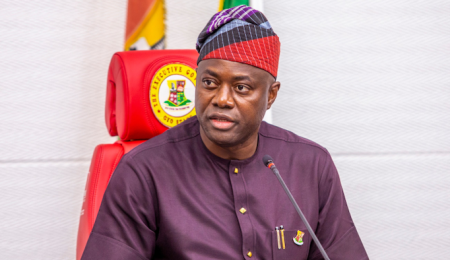The former governor of Edo State and Senator representing Edo North, Adams Oshiomhole has attributed the collapse of the naira to the “excessive printing of money” by the Central Bank of Nigeria (CBN) under former President Muhammadu Buhari’s administration, citing the controversial Ways and Means policy.
Speaking at the Progressives Governors Forum’s meeting and interactive session in Benin City, Edo State, on Saturday, Oshiomhole criticised the CBN’s reliance on the policy, which allows the federal government to borrow from the apex bank to cover short-term fiscal deficits.
“We are coming from a country that was almost like Zimbabwe or Idi Amin’s Uganda where he asked the Central Bank governor ‘go and print more money for us to share to the people’. And the governor said, ‘if we print more money, Uganda currency will be like a sheet of paper’,” Oshiomhole said.
“This is what the immediate past CBN governor was doing. In the Senate, we have the record that they printed over ₦31 trillion which they called Ways and Means,” he continued.
“You know when the government wants to deceive people they use jargon. They called it Ways and Means but I can tell you what it means: It means a situation in which the government prints banknotes, not based on what we have earned or any resources, just print banknotes to go and share to the people to meet their money illusion.”
Oshiomhole stressed the “excessive printing of banknotes” was the root cause of the naira’s steep depreciation.
“To understand the root cause of the present cost of living and the exchange rate regime, you must trace it and locate it in terms of the excessive amount of banknotes through so-called Ways and Means, which the past government created and which this government has eliminated,” he added.
He also highlighted the burden now placed on President Bola Tinubu’s administration to repay loans incurred by the previous government, stating, “Nigeria was borrowing every day the way fish drink water,” and it has now become Tinubu’s responsibility “to pay back those loans in order to guarantee the sovereignty of Nigeria.”
Adibe Emenyonu
Follow us on:



